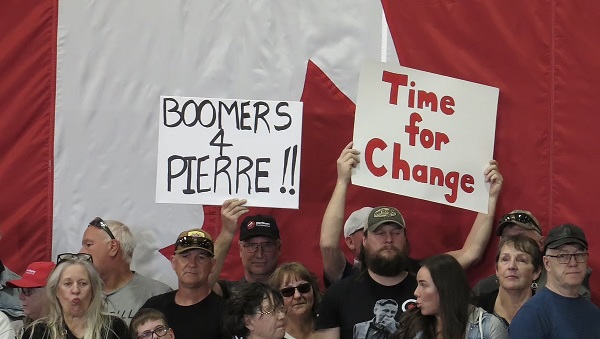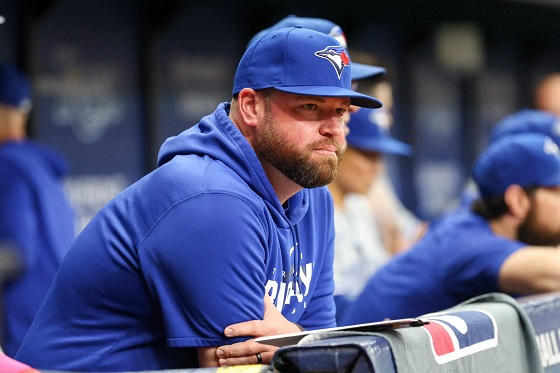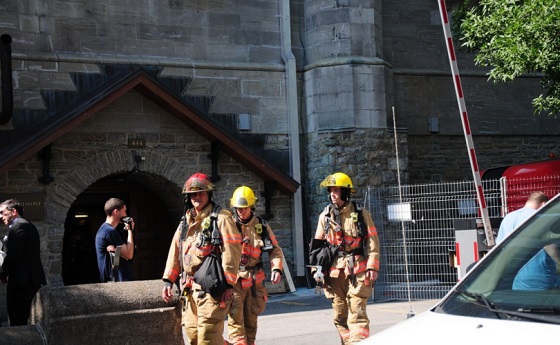Dan McTeague
My fellow boomers, Carney’s ‘Green’ obsessions are bad for all of us!

 By Dan McTeague
By Dan McTeague
One common narrative of this election has been “The Boomers vs. Everyone Else.” Poll after poll after poll has shown Mark Carney and his band of Trudeau Liberals with big leads among Boomers — Canadians over the age of 60, or so — with younger age groups favouring Pierre Poilievre and the Conservatives, sometimes by quite a lot.
Now, I am on record as being somewhat skeptical of the polls. They just don’t track with my experience on the ground, either door knocking for candidates or talking to people in my life. Maybe I’m wrong, but for me they just don’t pass the smell test.
That said, as a card-carrying Boomer myself, I am well aware that a great many members of my generation have been talked into supporting Carney. Some because they’re simply deluded and selfish, and have no concern for the future — an unfortunate characteristic of the ‘Me Generation,’ whose catchphrase was “Live in the Now!,” at least until our hair turned grey and we traded in our groovy sunglasses for bifocals, at which point we switched it to “Live in the Past!”
Deficits? Rising crime? A soaring cost of living, underlined by elevated food and energy prices? Their attitude is, ‘Who cares? I’ve got my investments and my retirement account! I’ve got my condo in Florida and the value of my house has exploded! I’ve got nothing to worry about!’
Or, as Lisa Raitt put it on CBC the other night, many Boomers “really don’t have a problem with the spending that is coming from a Liberal government. In fact, they embrace it. They enjoy it. And… I find it very frustrating because I look at the younger demographic who are really concerned about it because they’re the ones that are going to be stuck with the bill.”
But other Boomers are tempted by Carney because they’re legitimately confused about the best approach to this strange moment. Six months ago it seemed to them like a good idea to give the Conservatives a shot to get our country back on track. But then Donald Trump started in on his 51st state nonsense, and suddenly the mainstream media was crowing that the best way to punch Trump in the nose was to vote Liberal. Even when Trump himself has tacitly endorsed Carney, and the only nose endangered by a fourth Liberal term is ours, as we cut it off to spite our face.
This second group of Boomers has been convinced that a vote for Carney is a vote for change, that he’s not an ideologue like Trudeau, that he’s a businessman and a “safe pair of hands,” whom we can trust to turn the country around. That is, more-or-less, the CBC-approved narrative, but in no way does it match the facts on the ground.
Remember, Carney was a member of the Trudeau inner circle for years, which makes his continual deflection about the Liberals’ terrible record — “I just got here!” — totally disingenuous. His fingerprints are all over the Liberals’ policies, especially those related to energy. Remember that he was the king of carbon taxation, until its unpopularity led him to distance himself from the policy, zeroing out (not repealing) the Consumer Carbon tax, while doubling down on the Industrial Carbon Tax and remaining firmly committed to the so-called Clean Fuel Standards.
He’s stuck with the Trudeau government’s Electric Vehicle mandate, which requires that all new cars purchased in Canada be EVs beginning in 2035, despite the fact that EVs are more expensive than gas-and-diesel driven vehicles, and that the federal program subsidizing buying them has run out of money. And that doesn’t even touch on the fact that they don’t work well in cold climates like ours, that they will strain our electrical grid, and that there is no actual environmental benefit to switching to EVs. (Meanwhile, Poilievre has wisely pledged to end the EV mandate.)
And a good long look at Carney’s actual career should clear up the question of whether he’s less of an ideologue than Trudeau. In fact, he was always a hardcore environmentalist first and a banker second. Don’t forget that he founded the Glasgow Financial Alliance for Net-Zero (GFANZ,) an organization whose goal is to force his Net-Zero ideology on an unsuspecting world by pressuring banks and other financial institutions not to lend to or invest in oil and gas companies or projects, whether or not those projects would generate revenue and benefit their shareholders. Carney himself described GFANZ as being “relentlessly, ruthlessly, absolutely focused on the transition to net-zero.”
Now GFANZ has fallen a long way over the past few months, as major banks in both the U.S. and Canada dropped out of it over accusations that its activities constituted collusion. But even so, Carney’s obsession with ridding the world of hydrocarbon energy doesn’t bode well for a country like ours whose economy is so heavily reliant on oil and gas.
While Carney himself was personally raking in millions of dollars at Brookfield and elsewhere, the Carney-advised Liberals were running our national finances into the ground, leaving us second-to-last for real GDP growth in the OECD since they came to power. We’ve gone from fifth place on the quality of life index, in 2014, tied with Denmark and Finland, to twenty-ninth today! Mark Carney owns that.
This is exactly the kind of person you don’t want running your country. And that is something that Boomers of all stripes should recognize. Carney-supported policies have made life harder and more expensive in the present moment, and if he’s elected, Carney-enacted policies will make life harder and more expensive, not just in the distant future, but in the near and medium term as well, and not just for your children and grandchildren, but for you and your investments as well.
Keep that in mind when you go to the polls.
Dan McTeague is President of Canadians for Affordable Energy.
Business
The Liberal budget is a massive FAILURE: Former Liberal Cabinet Member Dan McTeague

Prime Minister Mark Carney tabled his government’s long-overdue budget yesterday and took the same approach as his predecessor – spend, spend, spend.
Canada’s deficit is now a staggering $78 BILLION. To make matters worse, Carney doubled down on the industrial carbon tax.
Dan McTeague explains in his latest video.
Automotive
Canada’s EV experiment has FAILED

By Dan McTeague
The government’s attempt to force Canadians to buy EVs by gambling away billions of tax dollars and imposing an EV mandate has been an abject failure.
GM and Stellantis are the latest companies to back track on their EV plans in Canada despite receiving billions in handouts from Canadian taxpayers.
Dan McTeague explains in his latest video.
-

 Business2 days ago
Business2 days agoCarney shrugs off debt problem with more borrowing
-

 Alberta2 days ago
Alberta2 days agoWhen Teachers Say Your Child Has Nowhere Else to Go
-

 Automotive2 days ago
Automotive2 days agoThe high price of green virtue
-

 Addictions1 day ago
Addictions1 day agoCanada is divided on the drug crisis—so are its doctors
-

 Bruce Dowbiggin1 day ago
Bruce Dowbiggin1 day agoMaintenance Mania: Since When Did Pro Athletes Get So Fragile?
-

 MAiD2 days ago
MAiD2 days agoQuebec has the highest euthanasia rate in the world at 7.4% of total deaths
-

 Daily Caller2 days ago
Daily Caller2 days agoProtesters Storm Elite Climate Summit In Chaotic Scene
-

 National1 day ago
National1 day agoConservative bill would increase penalties for attacks on places of worship in Canada









